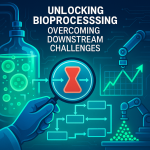🔍 This technique allows for non-invasive analysis of cell health and productivity.
📊 The study highlighted high accuracy in measuring glucose and lactic acid levels.
🛠️ This approach simplifies monitoring, potentially paving the way for advanced, in-line bioprocess analytics.
💡 Future developments could enhance efficiency in biomanufacturing.
Introduction:
The article discusses advancements in upstream monitoring techniques for bioprocesses, particularly through the implementation of a novel form of attenuated total reflection Fourier transform infrared (ATR-FTIR) spectroscopy. Developed by a team of researchers led by Dr. Holly Butler at Dxcover, the technology aims to improve the efficiency and accuracy of monitoring cell health and productivity without damaging the cells or requiring extensive sample preparation.
- Upstream monitoring in bioprocessing is crucial for tracking cell health and productivity using process analytical technology (PAT).
- The use of ATR-FTIR spectroscopy enables non-invasive data collection without damaging cells or complex sample preparation.
- Researchers have modified ATR-FTIR spectroscopy with disposable internal reflection elements to address issues such as sample matrix interference.
- The study demonstrated the method’s effectiveness in monitoring Chinese hamster ovary (CHO) cells and quantifying metabolites like glucose and lactic acid, achieving high predictive accuracy.
- The findings suggest the potential of this technology as a minimally invasive in-line tool for bioprocess monitoring, paving the way for further advancements in upstream PAT methodologies.
Conclusion:
The innovation in ATR-FTIR spectroscopy represents a significant step forward in upstream monitoring, providing a rapid and efficient means of assessing cell health and metabolite levels during bioprocessing. This research lays the groundwork for future developments in in-line monitoring technologies, which could greatly enhance the productivity and quality of biopharmaceutical manufacturing processes.



